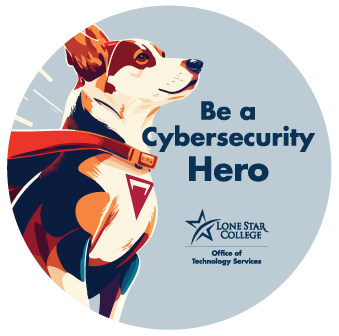Did you receive a "phishy" email? Report it.
If you receive a suspicious email in your Lone Star College email — or even one that you think may legitimate, but you're worried about clicking a link or opening an attachment — report it and we'll do the investigating for you. There are multiple ways to report a "phishy" message (or even a phone call):
- Click the Report Message button when in Outlook or Microsoft 365,
- Submit the Report a Phishing / Scam / Spam Email form, or
- Call the IT Service Desk at 281.318.HELP (4357).

Use Strong Passwords & Password Managers
Tip #1: Make your passwords long.
- In 2025, every password should be at least 16 characters.
- Hackers can crack short passwords in seconds, but a 16-character password could take millions of years to break.
Tip #2: Keep them unique.
Never reuse passwords. Each account deserves its own strong, random password.
Tip #3: Use a password manager.
- Password managers make it simple to generate, store, and autofill strong, unique passwords.
- Common myths—like “if a password manager gets hacked, all my passwords are gone”—aren’t true. Password managers use encryption and don’t even know your master password.

Enable Multifactor Authentication (MFA)
Tip #1: Any MFA is better than none.
MFA adds an extra layer of protection beyond your password.
Tip #2: Some MFA methods are stronger than others:
- Best: Biometrics (fingerprint, FaceID) or authenticator apps (Google, Microsoft, Duo).
- Good: Hardware tokens, text or email codes (but beware SIM swap risks).
- Weak: Security questions (answers are easy to guess).

Keep Your Software Updated
Tip #1: Turn on automatic updates.
Updates fix security flaws that hackers exploit.
Tip #2: Update everything.
Not just your computer—phones, apps, browsers, even smart devices need patches.
Tip #3: Don’t ignore update prompts.
Delaying updates leaves your device open to known vulnerabilities.
?
Recognize & Report Scams
Tip #1: Stop and think before you click.
Phishing emails and texts often create urgency (“Your account will be locked!”).
Tip #2: Check the details.
Look for misspellings, unusual sender addresses, or suspicious links.
Tip #3: Report it.
At LSC, forward suspicious emails to phishing@lonestar.edu. Reporting scams helps protect everyone.
By taking small, simple steps — using strong passwords, enabling MFA, updating your software, and reporting scams — you help keep Lone Star College and yourself safe online.
Stay safe online!

